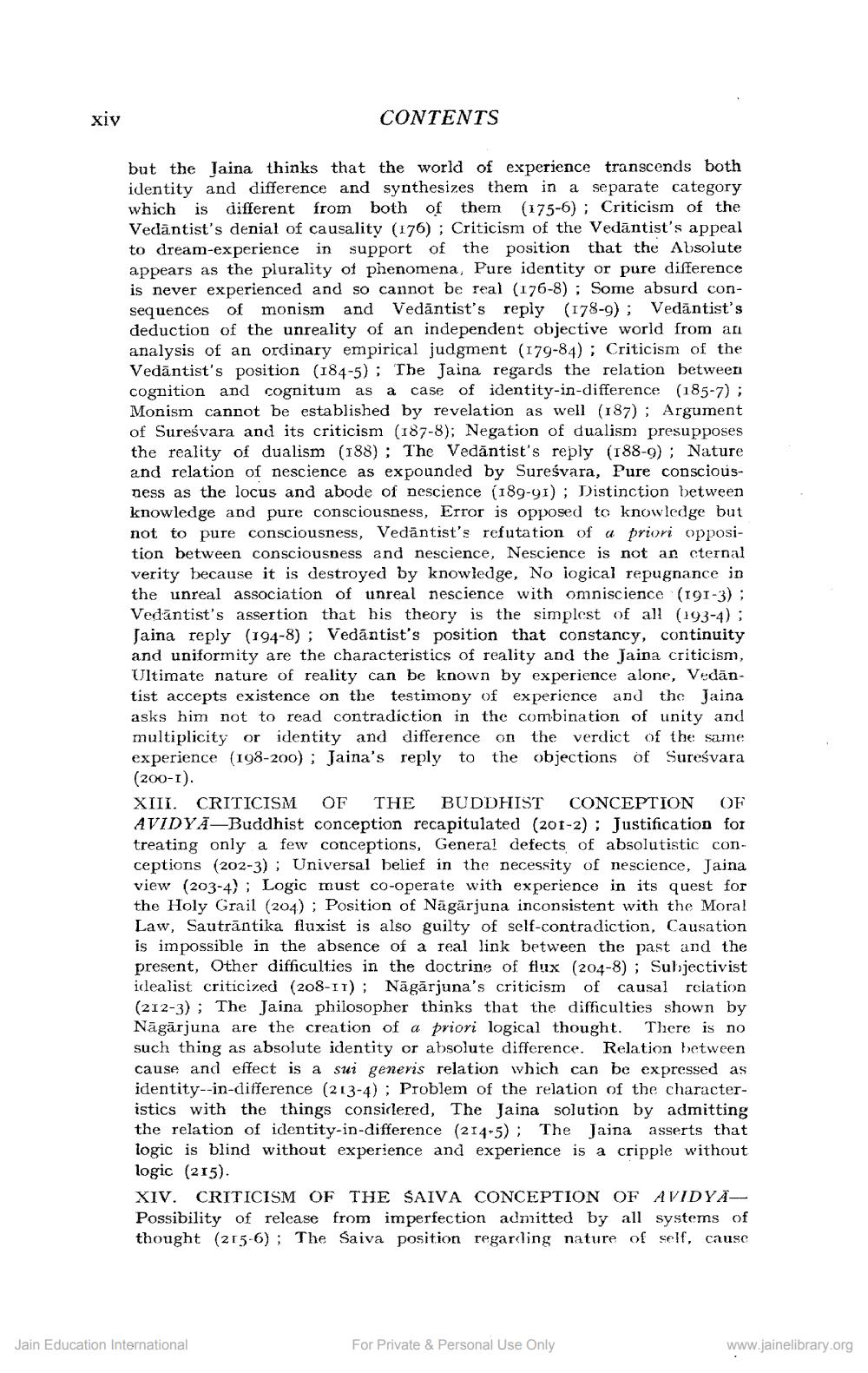________________
xiv
CONTENTS
but the Jaina thinks that the world of experience transcends both identity and difference and synthesizes them in a separate category which is different from both of them (175-6); Criticism of the Vedāntist's denial of causality (176); Criticism of the Vedāntist's appeal to dream-experience in support of the position that the Absolute appears as the plurality of phenomena Pure identity or pure difference is never experienced and so cannot be real (176-8); Some absurd consequences of monism and Vedāntist's reply (178-9); Vedāntist's deduction of the unreality of an independent objective world from ani analysis of an ordinary empirical judgment (179-84); Criticism of the Vedāntist's position (184-5); The Jaina regards the relation between cognition and cognitum as a case of identity-in-difference (185-7) ; Monism cannot be established by revelation as well (187); Argument of Sureśvara and its criticism (187-8); Negation of dualism presupposes the reality of dualism (188): The Vedāntist's reply (188-9); Nature and relation of nescience as expounded by Sureśvara, Pure consciousness as the locus and abode of nescience (189-91); Distinction between knowledge and pure consciousness, Error is opposed to knowledge but not to pure consciousness, Vedāntist's refutation of a priori opposition between consciousness and nescience, Nescience is not an eternal verity because it is destroyed by knowledge, No iogical repugnance in the unreal association of unreal nescience with omniscience (191-3); Vedāntist's assertion that his theory is the simplest of all (193-4); Jaina reply (194-8); Vedāntist's position that constancy, continuity and uniformity are the characteristics of reality and the Jaina criticism, Ultimate nature of reality can be known by experience alone, Vedāntist accepts existence on the testimony of experience and the Jaina asks him not to read contradiction in the combination of unity and multiplicity or identity and difference on the verdict of the same experience (198-200); Jaina's reply to the objections of Sureśvara (200-1). XIII. CRITICISM OF THE BUDDHIST CONCEPTION OF AVIDYA-Buddhist conception recapitulated (201-2); Justification for treating only a few conceptions, General defects of absolutistic conceptions (202-3); Universal belief in the necessity of nescience, Jaina view (203-4); Logic must co-operate with experience in its quest for the Holy Grail (204); Position of Nagarjuna inconsistent with the Moral Law, Sautrāntika fluxist is also guilty of self-contradiction, Causation is impossible in the absence of a real link between the past and the present, Other difficulties in the doctrine of flux (204-8); Subjectivist idealist criticized (208-11); Nāgārjuna's criticism of causal relation (212-3); The Jaina philosopher thinks that the difficulties shown by Nāgārjuna are the creation of a priori logical thought. There is no such thing as absolute identity or absolute difference. Relation between cause and effect is a sui generis relation which can be expressed as identity--in-difference (213-4); Problem of the relation of the characteristics with the things considered, The Jaina solution by admitting the relation of identity-in-difference (214-5); The Jaina asserts that logic is blind without experience and experience is a cripple without logic (215) XIV. CRITICISM OF THE SAIVA CONCEPTION OF AVIDYAPossibility of release from imperfection admitted by all systems of thought (215-6); The Saiva position regarding nature of self, cause
Jain Education International
For Private & Personal Use Only
www.jainelibrary.org




